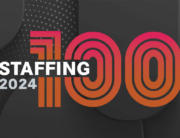In an ongoing series, Staffing Industry Review features excerpts from a 2019 Executive Forum session based on SIA President Barry Asin’s and Charted Path founder Mike Cleland’s book, Breaking Through: Leadership Disciplines from Top-Performing Staffing Firms, which captured the stories of staffing industry executives whose companies have reached the topmost 1% of US staffing fi rms. Three executives featured in the book participated in the Forum presentation, including The Delta Companies founder, Jeff Bowling. Here is his case study.
* This case study is based on the transcript of a session from the 2019 Staffing Industry Executive Forum. It has been edited for brevity and clarity.
Jeff Bowling: In 1996, I was a youth-level and community college baseball coach and professional scout. I got to complaining about the hours and poor pay one Saturday night to a physician whose son I had recruited; he said I should look into physician staffing, physician recruitment, because there is good money if you are a good recruiter. The next day I did some research and on Monday, I sent my résumé to Merit Hawkins and Associates. Thirty days later, I was working as a physician recruiter.
Then, almost a year later, Dave, whose young son I used to coach, called me and said, “You’ve gotta come back to the team. It’s going to pot and we need you to come back and coach.” I said, “Sorry Dave, I’m pretty good at this recruitment thing; not interested.” After three breakfast meetings, we had a deal: He would fund the startup of The Delta Companies, provided I coach his son’s baseball team. And that’s how The Delta Companies was started.
Commitment. But I want to talk about commitment because mine came from a certain time: In August 2003, Dave, whose son by this time had gone off to college, wanted out of the business. Long story short, I gave him the receivables, and I kept the other assets, the intellectual property and the momentum that was there.
I had to sit down with the eight or nine most-senior folks in the organization and say, “I have no cash. In fact, I’m not sure how I’m gonna pay you. I’ve got some personal credit cards and some cash. Give me some rope here, I’ll figure this out. But there are no guarantees.”
One person left, who said, “I can’t stomach this kind of risk.” I totally understood and respected that. The rest of the group stayed. Some even threw their credit cards on the table.
And in a nano-second you go from opportunity to responsibility. And I had responsibility from that point forward, not only to create a great company for these folks, but a great career. They gave me their trust and I had to honor that by creating the best company I could, which meant I had to be the best CEO I could be — and that’s where my commitment [for the business] stems from.
Execution. And then comes execution. A few days later, I went back to everybody and said, “If we’re gonna do this, we’re gonna grow, and we’re gonna go on this rocket-ship ride, you’ve got to grow your capacity. I’ve got to grow mine, too. We’re going to do this together.”
Part of capacity — it was not just ability, it’s appetite. You have to have an appetite for wanting to grow big. And this was my rallying cry. You have to grow your individual capacity so we can grow our collective capacity or you will get left behind.
In 2007, I had a doubting Thomas, a guy who was running the sales for the retained search group. He was averaging about 35 deals a month, which was about the [industry] average. We were in a meeting, and I asked him what it would take to double that. I pushed on him a little bit, trying to stretch him, trying to see what was possible and how we might do this, and finally, he said, “I don’t think you appreciate what we’ve done here. … I think we are getting just about all we can get out of the market.” I coached, I coached, I coached and finally, I had to demote him. I put two people in charge of sales and I was right. I won. A year later, we averaged 85 searches a month for the next several years.
But I also lost. I lost a good friend, I lost a loyal teammate, a guy that I’d lived with, who inevitably not only left, but took several people with him and started a competing firm. These are the emotional tolls we endure as we grow our business.
Crossroads. So this is your decision: You can grow your business or you can remain loyal to those people who were loyal to you. It’s tough, because they’ve helped you get from zero to $10 million or $20 million. But at some point, you have to be loyal to everyone else associated with the business.
This is why I was investing so much in training and development, because I wanted to give every person the opportunity to grow their individual capacity. And the good news with this is: If you grow for several years, if you’re successful in growing your business to $50, $70, $100, $200 million, it will happen over and over again, where you bump up against the wall with somebody and their individual capacity. And you’ll have a decision to make with each crossroad.
The founder’s dilemma. There is a Harvard Business Review article called “Do You Want to Be Rich, or Do You Want to Be King?” — a founder’s dilemma. Do you want to be the person who makes all the decisions, the dictator who gets all the glory? This is why most staffing businesses get stuck at about 20 people, because that’s about as many as any one person can dictate to. But if you want to go down the other path and grow and be successful, that’s the more painful path that I’ve described.
Very similarly, do you want to be the hero? Do you want to feed your ego? To be necessary for the business to run? Or are you OK with not being needed? Some folks want to be the fireman, to be the one who solves all the problems. But fires are dangerous. You have to be OK with crafting an environment and policy and process and systems where no fires ever show up. You’ve got to be OK with being in the background and being responsible for things just running smoothly — and that’s more than some people can muster.
Peer groups. In about 2006, I started working with a peer group — Jeff Harris, ettain group; Dan Campbell, Hire Dynamics; and Aaron Green, PSG Global Solutions. Each of our businesses was at about $25 million in revenue at the time. We sort of cheated from each other’s notes for many, many years and they are good friends of mine today. Peer groups are incredibly, incredibly important. I wouldn’t be here today if it hadn’t been for my group. The setback. By 2009, our revenue had grown to $65 million.
Then, in 2010, we dropped to $56 million — and not because of the recession. It was my mistake. We were thinly capitalized. We were always running on a shoestring budget and we were growing really fast — the combination of those things can get a little dicey at times.
So I was meeting with my CFO; we were in a cash flow crisis and I was really focused. The person who ran the locums business back then — the biggest, most profitable piece of our company — walks in the door and says, “Hey! We’ve been kicking butts and taking names. We have hit for 14 quarters in a row. I’m gonna ease up and not use KPIs anymore to manage folks.” And in a moment of sheer stupidity on my part, I said, “Fine. Whatever. You got this.”
That was in May of 2009. In September, we still hit budget because we had $165,000 in conversions. But in October, we went off a cliff, and it took us over a year to get back on track. This business unit, which had been thriving for so many years, stopped measuring KPIs for 90 days — and it set us back over a year.
There is a lesson learned, right? You never stop counting. Deadlines matter. Goals matter. That’s my thesis. That’s why private equity and publicly traded companies typically outperform private. Because they have clear deadlines that have to be met. And there are consequences when they are not. The formula for accountability from X to Y by Z — from the current state to the desired state, by the due date — is really simple — and it’s really hard at the same time. And you’ve got to be willing to throw down the gauntlet on these deadlines and make things work.
And it’s a paradox, because not only do you have to be disciplined, maybe you have good lieutenants, who are good at managing the short term, but you still have to pay attention to the short term. But you have to balance this with the long term. And as you’re thinking about the long term, allow people to fail. As long as they don’t put others in harm’s way, or put your organization in harm’s way, they’ve got to learn how to fail or else they just don’t learn at all. Long-term thinkers are not afraid to fire bad clients — or those high-performing prima donnas in your organization who are really toxic. Long-term thinkers invest in training, they invest in advertising and creating a brand. They go off site, while short-term thinkers would never go off site. But you have to have a blend of both types of thinkers.
Visionary vs. innovator. When I think about visionary, it is more about being able to have a goal, big goals that set out about 10 years. To be able to put a plan around it. To chunk it up in digestible pieces. Put the right people on the right parts of that and then have the discipline to see it through. That’s vision.
Innovation comes from a necessity to hit those goals. But innovation doesn’t come without stretch goals and a real discipline and desire to hit these goals.
Hindsight. While I have no regrets, if I could go back and change any one thing, though, I would tell you this: We had our most successful hiring when I had a $200K, executive-level doing the hiring. Way overpaid to do all the hiring. But it was the most successful period we had. I got a little overconfident and put two $50,000 per year HR clerks in charge of hiring and it really hasn’t been the same since. If I had to do it all over again, I would have never removed that person from that role. Culture. I love this definition of culture: the shared set of attitudes, behaviors, values, goals and practices that characterizes a group. I never had a blueprint for how our culture would actually show up — the craziness, the fun, the orange walls and disco balls. But that’s not what’s at the core of our culture. What’s at the core of our culture is a lot of trust, caring for each other and winning.
People who say they don’t want to grow because they’re afraid to lose their culture, that’s just a fear of growth. Your culture doesn’t change. What changes is how you communicate, because you can’t just wheel up your chair and talk to everybody anymore. But the culture absolutely doesn’t have to change. Why can’t we laugh at meetings, why can’t you be yourself at work? Why do you have to go home stressed out every day? These aren’t requirements. And this is what we really worked against.
I believe that most people are mostly good. And that’s where you focus and that’s where you spend your time and energy, on those people. When you believe in people and you trust in people, they’ll give it back to you in spades. When they do disappoint, you’ve got to provide them some grace. Never get tired, never get callous, never get jaded and make your bets on people. That’s the only way you can grow.
Want to find out how your firm can break through? Visit www.staffingindustry.com/breaking-through







